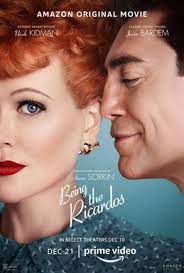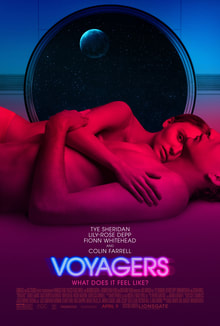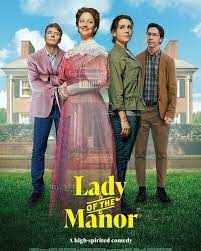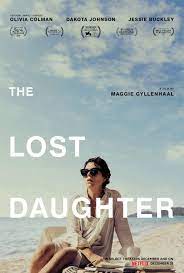|
In 1386 the last judiciary duel was held in France. Not the for all time final, mind you, but the last judicial one. Meaning the one deciding life of death for the participants.
The participants here were Sir Jean de Carrouges and squire Jacques Le Gris. Once bros and now bitter foes. The charge was rape, Le Gris stood accused of raping de Carrouges’ wife. A charge so serious that men got to fight to the death about it while the rape victim herself stood to be burned at the stake should her defender prove less than able fighter. Fun times in Medieval Europe, right? Anyway, that’s how this movie starts. A dynamic duel, two formidable opponents facing off while the mad king Charles VI giggles in the stands. It appears, he was easily amused. Plus, you know, there were no tvs back then. So, anyway, the once upon a time and forever bro team are back (have they actually worked together since Good Will?) and decidedly politically correct about it. Adding a woman to their writing tea, they adapted this older nonfiction book quite excellently, cleverly dividing it into three sections, since there are three sides to every story, especially ones that resemble a triangle. That’s right, unlike in Medieval France, a woman here is given a proper if oppressed by circumstances voice. Her story is last. After the self-aggrandizing tale of the righteous knight de Carrouges and the self-justifying tale of the preening squire Le Gris, we get to find out about the real sequence of events from the Marguerite de Carrouges herself. It is, unsurprisingly, grim. The movie is by turns a lavish historic actioneer the likes of which you’ve come to expect from Ridley Scott, the clever character-driven tale from the surprisingly good writing team and a #MeToo tale of yore. As such it is uneven. But also, strangely compelling for such a gory bombastic bonanza of a movie. There’s some fascinating casting going on here too. The writers have cast themselves, a pair of strikingly unMedieval looking bros, as the knight and the count who hates him, adding distinctly European looking Adam Driver in the mix for some authenticity. The authenticity stops there. The three of them don’t even try for an accent, adopting instead a sort of clear overpronunciation of certain words. What they go wildly for is hair. The knight gets a killer mullet. The count gets a platinum blonde short ‘do with matching eyebrows and a goatee. The squire gets long flowing locks, because he’s the stud here and also because it’s difficult to imagine Driver with hair that isn’t his hair, but maybe longer. The women had some really fascinatingly ugly hairstyles back in the days, notably the wheels on the side of heads situation a la queen. Or the knight’s mother do’, now there’s a perfectly medieval looking actress. And then there’s Marguerite. A lesser-known actress, one of a British tv fame, a somewhat surprising choice to be cast opposite some of the world’s most famous male stars, btu there it is. And she holds her own. Her almost pretty and expressive face lands itself nicely to the character so much of whose life is meant to be repressed and internalized by her circumstances and time. The rest…well, the characters are taken through a significant length of time throughout the movie, though not given to any frivolities like aging. And the fighting scenes here are Ridley Scott’s-specialty brutal, the duel itself is a masterpiece of visceral brutality. It’s lush and lavish as far as historical dramas go, of this there’s no question. And with its pro-feminist message, it’s as timely as pandering gets. Feminism is probably something testosterone-driven bonanzas like this never had to think twice about until now and it is strange to see the combination. Interesting, but strange. It’s like here’s this huge boy movie with something for the girls. See? Aren’t we clever in our inclusivity? Well, are they? It remains unclear. The box office says otherwise, the movie has barely recouped (at the time of this review’s publication) not even a third of its 100 million budget. Personally, I found it sufficiently entertaining (and not just because of the hair) and reasonably dynamic for its unwieldly 153-minute length. For whatever that’s worth to you.
0 Comments
The Ricardos, on screen and in real life, had some turbulence as a couple. Aaron Sorkin, the man who specializes in cerebral dramas a la West Wing, took one especially rough week out of their life and made it into a movie starring the incomparable stick figure of Nicole Kidman and the craggy charms of Javier Bardem.
Because this is a double dose of surreality, a show inside of a show, it does away with certain limitations…mainly age. During the week depicted in the movie Lucille Ball is approximately 41 and Ricky’s 6 years her junior as played by the Kidman and Bardem both of whom are in their early 50s. Kidman’s casting was somewhat controversial in general, although endorsed by the Lucie Arnaz (the real-life Ricardo baby), but the thing is Kidman is a genuinely good actress and does her utmost best to embody the screen legend. It’s just that a. she doesn’t really look like Lucy (unless it’s in black and white, in black and white she surprisingly passes) and b. she looks increasingly less like a person as time goes by. Stemming precisely from her efforts to arrest the passing of time. I mean, can her skin be any tighter wrapped around her skull? The effect is beginning to look frightening, like a pretty crypt keeper situation. And does she eat? At all? Ever? I can only fathom the pressures an aging actress must be under in a society obsessed with beauty and youth, but there are many actresses of Kidman’s age and caliber (Julianne Moore, Rachel Weisz, etc.) who manage to look both good and reasonably like themselves. Kidman looks…lifelike. It’s freaky and distracting. Bardem, despite being way older than his fictional counterpart, does his animated best with a very kinetic role; he is a singing dancing charm machine of a man. Irresistible to Lucy, and apparently to others. Their balance is entertaining and dynamic and makes a strong spine for a movie, though the supporting cast is excellent too. And overall, what do we learn? That age is an illusion? That a happy marriage is an illusion? That spotlight is weighted? That Aaron Sorkin is a dialogue wizard? Sure, sure, sure. The movie ends with Lucy finding solid evidence of Ricky cheating and follows a written afterword of how she divorced him the second production ended, which makes her seem like a strong woman who knew her mind and her power, but consider the dates…the week the movie is in 1952, the divorce occurred in 1960. Meaning they still had years of infidelity to contend with and all that. Nevertheless, it does present a certain version of Lucille Ball, as both the entertainer and a woman. As a former, she is a comedic genius, a person with clear vision and determination. As a latter, she is someone struggling to find balance between being a good of the time wife i.e. submissive and at the same time in a way a boss. She strives to make Ricky feel like more of a man and then pays for it, because his manly ways lead him to other beds. While the ending makes Lucy seem like a savvy businesswoman above all, was she really? She seemed to have repeated the Ricky pattern with her second marriage, a much younger man this time, also promoted to producer, etc. But who knows. And in the end, does it really matter. In the end, isn’t all that matters is that at some point two people came together and created a beloved show that went on for years and entertained millions for decades. And if those two fought, cheated, divorced, well, that’s their business (though we certainly try to make it our own), because they left a legacy (and not just their kids), but a public legacy that secured them a tv screen immortality irrespective of all other noise. There’s no question of whether Lucy was loved. There’s a tv show title forever enshrining that love. h It was meant to be a perfect community destined for a great purpose, the saviors of humanity, the shining beacon of hope. The multiracial melting pot, the best of the best the humankind had to offer. Until a lying, cheating, sexual harassment-leaning, dangerous demagogue gained power among them and used it to bring out the absolutely worst qualities in them under the guise of empowerment. Overriding their pre-established democracy, through his toxic rhetoric and his ugly actions and fabrications he threatened and actively tried to undo the very fabric of their carefully crafted society.
Does that sound at all familiar? Now, wouldn’t it be awesome if a science fiction movie was clever enough to incorporate all that sociopolitical commentary into this plot? After all, science fiction is a traditionally great genre for social commentary. Alas, The Voyagers is nowhere near that clever of a movie. It isn’t even that good of a movie. It does feature a somewhat utopian or dystopian (depends on who you ask) society of teens on a spaceship, teens genetically engineered and bred specifically for this mission, which is meant to reach a first habitable planet discovered three generations from now. There’s only one adult supervising them, and he isn’t going to be around forever. The idea is that the kids are smart enough to govern themselves, breed and repeat the cycle until the planet is reached. The kids all drink a blue liquid designed to maintain them at a certain level of sexually-repressed docility and once they decide to stop drinking it, they become more…themselves. For some, just means horny. For others, it means something much darker. For one of them, it means dictatorial powers and homicidal tendencies. Now the kids are splitting up and in-fighting in the world of induced hysteria, where there may or may not be an alien monster out to get them. The kids must confront their very natures and decide what is and isn’t natural to them. It all sounds promising, but the execution leaves a lot to be desired. From the shabby writing to the uneven pacing (with a very soggy middle), it just isn’t that exciting or even that good of a movie. The cast is led by that Texan Bart Simpson lookalike Tye Sheridan who is apparently and inexplicably a hot commodity. He's a fine character actor, especially for Southern set/themed movies, not necessarily a leading man. His love interest is played by the baby Depp, looking like a baby doll of impossibly tiny proportions. And the antagonist is played by some kid I’ve never heard of. The rest doesn’t really matter, except that Bran Stark is there, looking tall out of the wheelchair and given almost no lines at all. Should have just stayed in Westeros, really. Also, a crucial detail...if everyone starts breeding early, that means three generations will turn into four generations, meaning a terrible strain on supply and logistics. Those libidos were dampened for a reason, people. Think of the mission. The movie is mildly entertaining at best, but mostly just a bunch of wasted potential. It crapped out at the box office accordingly. Not a voyage worth undertaking, dear readers. There are so many actors turning to directing and sometimes writing/directing these days, that it’s never a surprise anymore, more like a matter of time. This time, it’s the preternaturally youthful looking Justin Long, who apparently wanted a project to do with his brother and did this – a sort of inane comedy that he’s done plenty of in his career.
Not quite stupid enough to be offensive, Lady of The Manor is more on a silly side of things. it’s dangerously close to stupid, mind you, but mostly steers clear of it. This is in no small way due to the acting talent Long assembled and a (very) occasional situational joke that actually lands. The plot involves the ever-excellent Melanie Lynskey as one of those clichéd lovable losers, except that the Long brothers take it too far on the loser aspect and it’s only Lynskey’s considerable charm that managed to balance out the act. Otherwise, what you have is a ditzy stoned slob with no apparent redeeming qualities. This ditzy stoned slob manages to stumble into a live-in tour guide situation for a historical mansion the lady of which is still very much present, if in spirit only. Judy Greer seems to have fun with her southern belle role and accent as she tries to reform her ‘impersonator’ as she refers to her into a lady. It’s an ambitious goal, certainly. Lynskey’s character gives in to ladyfying slowly and reluctantly. She’s much more enthusiastic about the prospect of hooking up with the playboy scion of the manor’s family, the over-tanned Tanner, played with a sleazy aplomb by the boyishly handsome ex Mr. Reese Witherspoon. When in fact, she should be hooking up with Long’s character, because he’s the proverbial last-finishing nice guy. Long’s interest in her is inexplicable, unless it is a case of extreme opposites attracting, but there you have it, can’t have a rom-com without it. Eventually, some fart jokes later, it all works out, because those movies always do. And so, there you have it. Watchable, kinda sorta decent, mildly entertaining, nothing special, and perfectly forgettable. Kinda like Justin Long’s career if you think about, but that’s a mean thought, don’t think that thought. Long’s amusing in his own right and has a great voice. And he can write a pretty good fart joke or two. There’s never been a better time to be a woman in cinema. In a manic effort to make up for decades of oppression and inequality, the powers that be are twisting themselves creatively to accommodate more women-driven efforts. And that’s all good and great, but it doesn’t equate to quality. Quality remains pretty much gender-free.
There have been many instances of actors turning directors and doing a great job of it. The latest streak of the female actors turned directors on Netflix (a company that never met a bandwagon it didn’t eagerly jump on) falls quite short of that greatness. Not in the acclaim department, mind you, these movies are seemingly tailor-made for acclaim. Great talent…acting their butts off. Sure. But…here comes the but…if you want your cinematic experience to be exciting, to be fun, to be properly engaging…these are not the movies for you. We’re not talking CGI-driven superhero extravaganzas, we’re talking just good movies, movies you can enjoy, be wowed by. This isn’t it. It seems that actresses turned writer/director/book adapters all follow the same model…languid paced narrative with striking scenery and long actor takes where they can just act, and act and act. And that’s great in a way, because good acting is important, but it’s also not the end-all be-all Excalibur they think it is. To hang the entire movie upon acting is like hanging the entire movie upon CGI – not ideal. And yet, this formula was followed to a T, first in Passing and now in Lost Daughter, Maggie Gyllenhaal’s debut effort. She took a book by a famous female author who writes exclusively female-driven stories and adapted it into a slow-paced bonanza of emotional motherhood medication. Also, she got a great cast, a great location, and then sat back and let them act. And so, the ever-excellent Olivia Coleman plays the self-proclaimed unnatural mother, a woman who hasn’t done her best at mothering because she (gasp) was really into her academic career. Not apparently because her children were annoying brats the way most kids are. Why did Coleman’s character (played in youth by Jessie Buckley who does a really good job despite the absence of physical resemblance) feel the need to have kids in the first place? Especially have them so young? Especially have more than one? No idea. She’s supposed to be smart. And yet, she did her biological duty anyway, and then complained about it, and then abandoned it for a few years for good measure. Now, she’s 48, her babies are adults, and she comes alone to Greece for a relaxing vacation, a vacation that continues to be somewhat interrupted by the presence of a large loud family who may have some criminal connections. The women in the family are either pregnant or already babied. Dakota Johnson (almost unrecognizable with jet-black ‘do) has a young daughter, who proves to be a major trigger for Coleman’s character. And so Dakota vamps it up, while flirting with the hunky Irish boy who summer-works there, and trying to cope with her annoying baby girl, who mostly cries. She mostly cries because Coleman’s character straight-up stole her dolly. Yes, you read that right. The trauma is doll-related and we’re not talking Chucky. Coleman cradles the doll like her lost youth and tends to it like she didn’t to her kids back in the day. Other than that, she just goes around having a fairly decent vacation. The locals are rude, but the scenery is unbeatable. In flashbacks, she is given more to do, as she tries and fails to balance out her professional and personal lives, eventually resulting in an affair with Gyllenhaal’s main man, a striking hirsute Sarsgaard whose hairy torso she fondles lustfully while they whisper in Italian to one another. But overall, it’s a meh of a movie. Strikingly so. Yes, motherhood is tough and balancing it out with a career is doubly so. I mean, RBG did it, remember that movie. That movie was about something. This one doesn’t really have a message outside of acknowledging the issue itself. It also doesn’t really have any especially likable characters and the dolly stealing just comes across as sadistic and weird. Everyone’s peculiarly obsessed with ages. Everyone asks everyone how old they are in a way people just don’t do in real life. And then everyone fawns over how young Coleman looks for her age (she doesn’t). The movie begins decently enough, it promises something of a mystery or at least, a dramatic denouncement that is stab-worthy as Coleman drops on the shore with a bloody wound, but it doesn’t deliver on that promise or any others for that matter. Because the plot is so clearly secondary to the art of acting. And the art of acting is overdone. 120 very slow minutes later and all you’re left with is a desire to have picked another movie. But here, bet this’ll do great come awards time. |
Archives
December 2023
Categories |





 RSS Feed
RSS Feed
